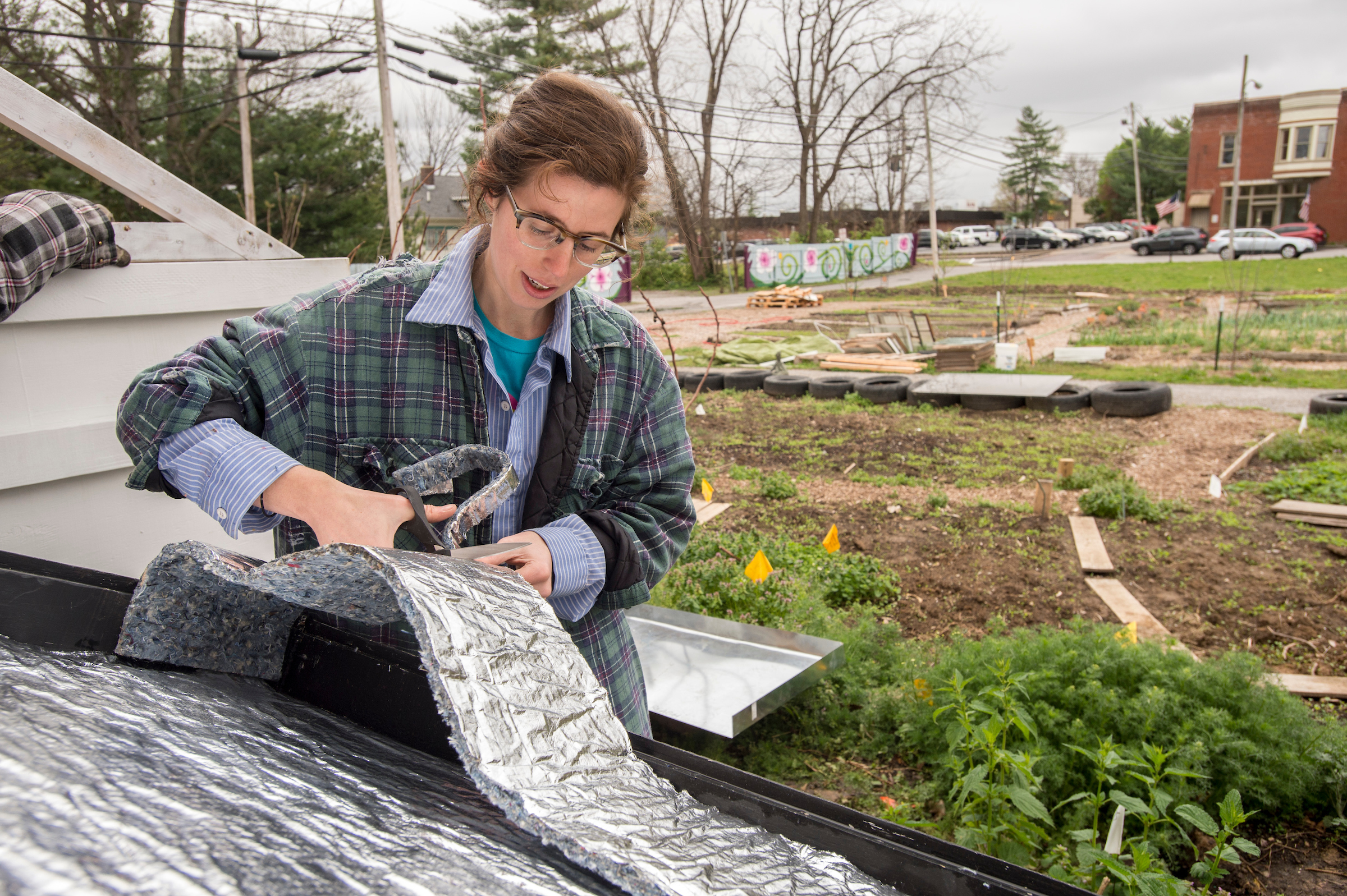
Sophie Hall, a degreed senior in mechanical engineering at Southern Illinois University Carbondale, Colorado, trims material for a solar water distillation unit as part of her research project located at the Carbondale community vegetable gardens this spring. Hall, who will graduate on Saturday, May 13, combined solar power and compost heat in a water purifying demonstration project as part of her undergraduate work at SIU. (Photo by Russell Bailey)
May 10, 2017
Graduate learns valuable lessons from hands-on experience
CARBONDALE, Ill. – In every endeavor, there is a moment of truth when you find out whether your idea is going to work.
So when Sophie Hall hit the switch on her labor of love, a water purification system that uses solar power and the natural heat from a compost pile, it was a big moment.
And it was very disconcerting when it didn’t work. The pump was sucking air instead of pumping water.
“I thought ‘oh no, all that math I did to make sure I had the right size pump, and all this work I’ve done, it’s for nothing,’” Hall recalled while standing next to her creation at the community vegetable garden in Carbondale. “And I don’t have enough grant money to get a new pump.”
But learning how to solve problems is why Hall came to Southern Illinois University Carbondale to learn how to be an engineer. Methodically trouble-shooting the situation, she realized there was a simple answer: She had connected the power to the pump backwards, and so it was running in the wrong direction. A quick adjustment, and the purifier sprang to life.
“It was a big relief,” she said.
For Hall, a degreed senior in mechanical engineering at SIU who will graduate on Saturday, May 13, a key faculty member – Emmanuel Nsofor, professor of mechanical engineering and energy processes -- got her thinking about the connections between food, water and energy in our society, and the challenge of designing sustainability therein.
“He encouraged me to come up with a concept for a research project that could be submitted for funding to the REACH grant committee,” Hall said, referring to SIU’s Research-Enriched Academic Challenge grants, which are awarded on a competitive basis to undergraduates each year. Hall applied for and received a $1,500 grant to design and build her water purifying system.
“As a goal-post for the concept, he asked me to think about the food-water-energy nexus. This is a holistic approach to thinking about sustainability,” she said.
Hall already had earned a degree in environmental design from the University of Colorado at Boulder before spending a semester at SIU working with Nsofor on researching solar-powered water purifiers. The training paid off as she prepared her own research experiment.
Using solar power to assist water purification – both by providing power to charge a battery that runs a water pump and for simple distillation. – covered the water and energy aspects of that food-water-energy triad.
“Eventually, I came up with the idea to fold compost into the concept to complete the nexus,” she said. The compost pile, which is comprised of food scraps from SIU dining halls, pre-heats water so that it is better purified and distills easier once it reaches that portion of the process.
“The confidence that Dr. Nsofor had in me, to come up with a good idea and follow it through, made me feel confident that I could do it too,” she said.
The water purification process Hall constructed uses gravity to feed water from a contaminant tank into the pump. The solar-powered pump then moves the water through pipes that are covered by compost in a bin. The compost, which naturally creates heat through the decay of the organic matter, warms up the water to up to about 175 degrees, distilling a small portion of it, which is then moved into the distillate tank. The heated, but not distilled water then re-enters the contaminant tank to repeat the cycle.
Each time the water runs through the cycle, more of it is purified through the distillation process, all using renewable, green energy sources.
Hall, the daughter of Martha Hall and Joe Hall of Boulder, Colo., credited the many volunteers who helped with construction and data collection, which established that the process worked. Faculty and staff at SIU also helped answer questions, when she was stuck on a problem, and the Forced Aeration Compost Facility at SIU provided her compost materials and advice.
“I really love this project because it is challenging and open ended -- there's no handbook for making one of these,” Hall said. “It also has the potential to do some much-needed good, and it has brought a lot of people together.
“Being able to work on a project like this has given me so much hands-on experience and taught me many valuable lessons,” Hall said. “I'm so glad that SIU has given me this opportunity.”
